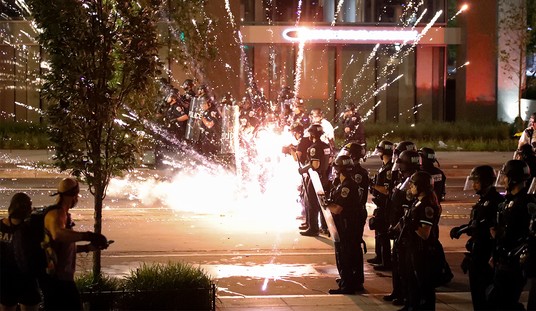“Sunday Reflection” is a regular feature, looking at the specific readings used in today’s Mass in Catholic parishes around the world. The reflection represents only my own point of view, intended to help prepare myself for the Lord’s day and perhaps spark a meaningful discussion. Previous Sunday Reflections from the main page can be found here. For previous Green Room entries, click here.
This morning’s Gospel reading is John 3:16-18:
God so loved the world that he gave his only Son, so that everyone who believes in him might not perish but might have eternal life. For God did not send his Son into the world to condemn the world, but that the world might be saved through him. Whoever believes in him will not be condemned, but whoever does not believe has already been condemned, because he has not believed in the name of the only Son of God.
John 3:16 is perhaps the most widely recognized verses in the New Testament. The most substantive reason for its resonance is because it encapsulates the final phase of God’s plan of salvation for all humanity in a single sentence, which acts as its own declaration of faith for believers. The other reason flows from its utter simplicity, which allows Christians to use this verse in all sorts of ways to spread the Gospel, including the display of the chapter and verse reference on placards and other items at public events, especially sporting events. Tim Tebow even wore eye-black patches at the University of Florida with the reference, which not only gained notoriety but prompted (minimal) exegesis in some unusual places.
There is much more going on in John 3 and our other readings today, though, than just the familiar quote from Jesus. In this chapter, John recounts a conversation between Jesus and Nicodemus, a Pharisee and a member of the Sanhedrin who had sympathy for Jesus and his message of salvation through repentance. Nicodemus came out to meet Jesus and the disciples after reports of the miracles Jesus had performed, hoping to gain some insight into His teachings.
Jesus at first tries to explain that Israel needs a spiritual rebirth: “Truly, truly, I say to you, unless one is born anew, he cannot see the kingdom of God.” Nicodemus, though, understands rebirth only in a physical sense: “How can a man be born when he is old? Can he enter a second time into his mother’s womb and be born?” Jesus then marvels that this concept could escape someone who is a “teacher of Israel,” and tries to explain the difference between the flesh and the spirit, which loses Nicodemus a second time.
This might be easy for us to miss, but this would have been a relatively revolutionary concept for the people of Israel at that time. They felt that they belonged to God through birthright as descendants of Abraham. While they certainly understood about sin and repentance — the Pharisees in particular — they would have balked at the notion that they needed a rebirth of any kind to enter into God’s favor. All that was necessary, most would have thought, would be to be an Israelite who keeps the letter of the law. John the Baptist addressed this same issue at another time, in Matthew 3:7-10 (also Luke 3:7-9), when he warned the Pharisees and Sadducees who came to watch his baptisms:
“You brood of vipers! Who warned you to flee from the wrath to come? Bear fruit that befits repentance, and do not presume to say to yourselves, ‘We have Abraham as our father’; for I tell you, God is able from these stones to raise up children to Abraham. Even now the axe is laid to the root of the trees; every tree therefore that does not bear good fruit is cut down and thrown into the fire.[“]
The concept and need for spiritual rebirth would have been much more foreign to Nicodemus than to us, and perhaps more so still for other members of the Sanhedrin class in Israel. The need for such a rebirth would undermine their claim for authority, and especially their claim to be learned in the ways of God, on which that authority rested.
In both of these passages, the clear exhortation is for repentance. John the Baptist explicitly calls for repentance and spiritual rebirth rather than just a genealogical claim on inheritance. Jesus speaks more analogically with Nicodemus in John 3:14-15, just before today’s Gospel reading: “And as Moses lifted up the serpent in the wilderness, so must the Son of man be lifted up, that whoever believes in him may have eternal life.” Moses lifted up the serpent staff in the wilderness to heal those afflicted by snakebites from a punishment sent by God for Israel’s lack of faith in Numbers 21. When their faith turned back to God and they prayed for relief, God instructed Moses to make a staff with a “fiery serpent” on it so that those who repented of their sins might be healed.
Immediately following that passage, Jesus then explains that He is the new and complete healing for the world in John 3:16-18. In order to have a part in eternal life, simply being a physical descendant of Abraham will not be enough. People will need to form themselves spiritually through faith in God and belief in His Son, who brings healing and light into the world. In the final three verses of this conversation with Nicodemus, which are not included in today’s reading, Jesus makes the analogy of Himself as healer and light even more clear:
And this is the judgment, that the light has come into the world, and men loved darkness rather than light, because their deeds were evil. For every one who does evil hates the light, and does not come to the light, lest his deeds should be exposed. But he who does what is true comes to the light, that it may be clearly seen that his deeds have been wrought in God.
The movement from darkness into light means spiritual rebirth and repentance for one’s sins, along with a true change in life that reflects this rebirth and faith. That message is emphasized in our other readings today. In Exodus 34:4-9, the Lord passes by Moses when he brings the stone tablets up Mount Sinai. Moses begs God to come along in their company, lamenting the “stiff-necked people” of Israel but praying for God’s forgiveness for their “wickedness and sins.” Paul writes in his second letter to the Corinthians (2 Corinthians 13:11-13) that spiritual rebirth on its own isn’t sufficient either. “Mend your ways, encourage one another, agree with one another, live in peace, and the God of love and peace will be with you,” Paul writes to the already-converted in Corinth, who have accepted Jesus Christ as savior but still struggle with the faith in practice. The path from darkness into light is a long one, fraught with the danger of backsliding.
Earlier, I noted that the concept of spiritual rebirth would have seemed foreign to Nicodemus, given the common understanding of God’s plan for Israel at the time. Is that so different than our own personal understanding in this age, though? At times in my life, I want to shrug off the responsibility that spiritual renewal puts in my life. “Hey, I didn’t break any commandments this week, Lord,” I want to say, “so I’m off the hook for prayer and reflection, right?” I’m sure I’m not alone in understanding and relating to the struggles that Augustine had before accepting his conversion to the faith, even though I already share that faith. The wish that we can get a pass from taking that daily journey from darkness into the light can be powerfully attractive. Isn’t it enough that I got baptized and confirmed? Can’t I just take the next 50 years off?
Well … no, but active love and faith in the Lord have their own rewards. His yoke is light, Jesus reminds us elsewhere, and He has already done the really heavy lifting in his death and resurrection. And we know that the work has succeeded, too, for God so loved the world — and each of us individually — that He gave His only Son so that those who believe will not perish but have eternal life. Jesus does not bring condemnation but restoration. The crucified Jesus is the new staff of healing, raised in the wilderness of this world, so that all those who suffer in sin may be cleansed and restored to true life. All we need to do is to repent of our sins, and lift each other up so that all may see that staff in the wilderness.
The front page image is of the altar in the Church of the Holy Sepulchre over Golgotha, the site of the Crucifixion, from my own personal collection.








Join the conversation as a VIP Member